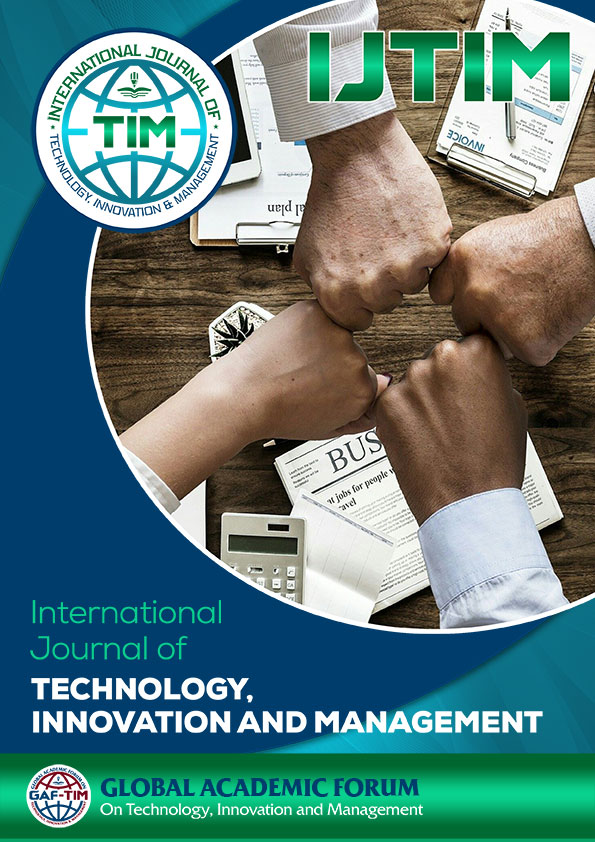Exploring the Impact of Artificial Intelligence language model ChatGPT on the User Experience
DOI:
https://doi.org/10.54489/ijtim.v3i1.195Keywords:
Artificial Intelligence, ChatGPT, Language Model, Design ThinkingAbstract
This study investigates the integration of AI language model tools, specifically ChatGPT, in the Design Thinking process to evaluate their effect on product design. While previous research has primarily focused on Design Thinking, limited research has been conducted on the application of AI tools in the process.
This study involved redesigning two previous projects using AI tools in the Design Thinking process. We conducted interviews with five designers and analysed ten Product Manager reports to understand the impact of using AI tools on one of the most popular innovation and problem-solving approaches called Design Thinking.
The findings indicate that integrating AI tools into the design thinking process, specifically in the Define and Ideate stages, can improve the efficiency and creativity of the UI. However, the successful implementation of AI tools requires a combination of technological expertise and creative design thinking.
The study emphasizes the potential for AI tools to complement human creativity and expertise in the design process, rather than replace them. The results contribute to understanding the appropriate application of AI tools in design and innovation while underscoring the importance of keeping humans at the centre of the process.
References
Arif, T. Bin, Munaf, U., Ul-Haque, I., 2023. The future of medical education and research: Is ChatGPT a blessing or blight in disguise? Med. Educ. Online 28, 2181052.
Chasanidou, D., Gasparini, A.A., Lee, E., 2015. Design thinking methods and tools for innovation, in: Lecture Notes in Computer Science (Including Subseries Lecture Notes in
Artificial Intelligence and Lecture Notes in Bioinformatics). pp. 12–23.
Chubb, J., Cowling, P., Reed, D., 2022. Speeding up to keep up: exploring the use of AI in the research process. AI Soc. 37, 1439–1457.
Enholm, I.M., Papagiannidis, E., Mikalef, P., Krogstie, J., 2022. Artificial Intelligence and Business Value: a Literature Review. Inf. Syst. Front. 24, 1709–1734.
Gao, J., Zhao, H., Yu, C., Xu, R., 2023. Exploring the Feasibility of ChatGPT for Event Extraction.
Haleem, A., Javaid, M., Singh, R.P., 2022. An era of ChatGPT as a significant futuristic support tool: A study on features, abilities, and challenges. BenchCouncil Trans. Benchmarks, Stand. Eval. 2, 100089.
Ismail, I., 2022. Entrepreneurs’ competencies and sustainability of small and medium enterprises in Tanzania. A mediating effect of entrepreneurial innovations. Cogent Bus. Manag. 9.
Kalla, D., Candidate, D., Carolina, N., Smith, N., Candidate, D., 2023. Study and Analysis of Chat GPT and its Impact on Different Fields of Study 8, 827–833.
Kim, S.-G., 2023. Using ChatGPT for language editing in scientific articles. Maxillofac. Plast. Reconstr. Surg. 45, 13.
Levy, M., Huli, C., 2019. Design thinking in a nutshell for eliciting requirements of a business process: A case study of a design thinking workshop, in: Proceedings of the IEEE International Conference on Requirements Engineering. pp. 351–356.
Lo, C.K., 2023. What Is the Impact of ChatGPT on Education? A Rapid Review of the Literature. Educ. Sci. 13.
Lund, B.D., Wang, T., 2023. Chatting about ChatGPT: how may AI and GPT impact academia and libraries? Libr. Hi Tech News 40.
Malefane Sekoboto, S., Mazanai, M., 2022. A Design Thinking Framework for Circular Business Model Innovation among South African SMEs A K Design Thinking Framework for Circular. Bus. Model Innov. among South African SMEs JDT 3, 19–36.
Micheli, P., Wilner, S.J.S., Bhatti, S.H., Mura, M., Beverland, M.B., 2019. Doing Design Thinking: Conceptual Review, Synthesis, and Research Agenda. J. Prod. Innov. Manag. 36, 124–148.
Sakirin, T., Ben Said, R., 2023. User preferences for ChatGPT- powered conversational interfaces versus traditional methods. Mesopotamian J. Comput. Sci. 24–31.
Shaji George, A., Hovan George, A., Martin, Asg., 2023. Partners Universal International Innovation Journal (PUIIJ) A Review of ChatGPT AI’s Impact on Several Business Sectors 9–23.
Verganti, R., Vendraminelli, L., Iansiti, M., 2020. Innovation and Design in the Age of Artificial Intelligence. J. Prod. Innov. Manag. 37, 212–227.
Verma, M., 2023. Novel Study on AI-Based Chatbot (ChatGPT) Impacts on the Traditional Library Management.
Xu, W., 2019. Toward human-centered AI: A perspective from human-computer interaction. Interactions 26, 42–46.
Zhai, X., 2023. ChatGPT User Experience: Implications for Education. SSRN Electron. J.















